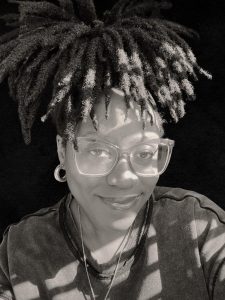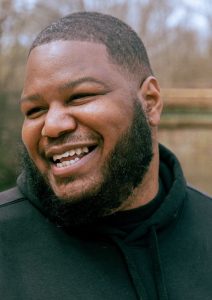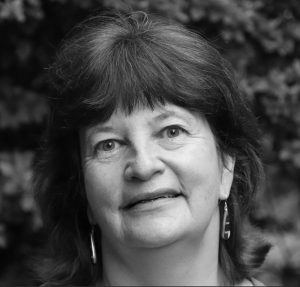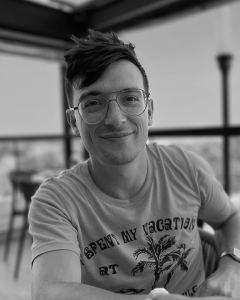 PHILADELPHIA, PA (April 2024) – Philadelphia Stories is thrilled to announce LaVonna Wright of Lithonia, Georgia (left) as the winner of the 2024 National Poetry Contest. This year’s contest was judged by poet Kirwyn Sutherland whose work has been published in American Poetry Review, Cosmonauts Ave., Blueshift Journal, Voicemail Poems, APIARY Magazine, FOLDER, The Wanderer and elsewhere. Kirwyn has served as Editor of Lists/Book Reviewer for WusGood Magazine, poetry editor for APIARY Magazine, and is a Watering Hole fellow. Kirwyn has a chapbook, Jump Ship, on Thread Makes Blanket Press. LaVonna Wright will be awarded $1,000 for “A Song for Anna Mae.” Wright and the runners up, honorable mentions, and editor’s choices will be honored at a reception next month in Philadelphia.
PHILADELPHIA, PA (April 2024) – Philadelphia Stories is thrilled to announce LaVonna Wright of Lithonia, Georgia (left) as the winner of the 2024 National Poetry Contest. This year’s contest was judged by poet Kirwyn Sutherland whose work has been published in American Poetry Review, Cosmonauts Ave., Blueshift Journal, Voicemail Poems, APIARY Magazine, FOLDER, The Wanderer and elsewhere. Kirwyn has served as Editor of Lists/Book Reviewer for WusGood Magazine, poetry editor for APIARY Magazine, and is a Watering Hole fellow. Kirwyn has a chapbook, Jump Ship, on Thread Makes Blanket Press. LaVonna Wright will be awarded $1,000 for “A Song for Anna Mae.” Wright and the runners up, honorable mentions, and editor’s choices will be honored at a reception next month in Philadelphia.
LaVonna Wright is a poet, educator, and artist from Augusta, Georgia. Receiving her MA in English from Georgia Southern University, LaVonna is devoted to a poetic and academic ethos that centers on innovation, equity, & truthtelling. She writes to venerate Black women’s narratives, personal and historical, often bearing witness to the ways in which they have navigated grief, unraveling, and silencing; through her work, LaVonna aims to reaffirm the tenderness that has not been offered to them. You can find her sharing writings in her newsletter, spending time in community, or cooking something slow.
Of “A Song for Anna Mae,” Sutherland comments:
“In the winning poem “A Song for Anna Mae: an erasure for Tina and those of us who chose to leave“, I was taken by not just the narrative that was able to be achieved from this erasure but also the sub or shadow narratives that the author crafted from just a couple of short/quick lines:
A long dress
carried me
I grew out of that
I fell
in love
and
Dreams told me a
Temper was
A story
broken, mean.
These set of lines are delicately simple but effective in how much heft they carry especially against the backdrop of Tina Turner’s, as well as many other black women domestic violence survivors’, story. The space in this poem allows the reader to linger on these lines/phrases, a further immersion into multiple texts: Tina’s words, the constructed poem, and the silences of her/their story/ies. In my experience, poetry is at its finest when it is well-crafted as well as being functional to its’ intended audience.”
Our three runners up are “Make Her Dance” by Vincente Perez of Albany, California; “Control” by Tara Elliott of Salisbury, Maryland; and “Tía rebuilds her house as she snores” by Purvi Shah of Brooklyn, New York.
 To continue our poetry celebration, our contest judge, Kirwyn Sutherland (right) will lead a masterclass webinar on Sunday, April 7th on the topic, “Rearranging Erasure.” Details on the webinar may be found at https://secure.givelively.org/event/philadelphia-stories-inc/masterclass-with-kirwyn-sutherland. In addition, we will honor the winning poets of the poetry contest in an afternoon reception on Saturday, April 20 at 3pm at the Kanbar Performance Space at Thomas Jefferson University’s East Falls campus, which will be free and open to the public.
To continue our poetry celebration, our contest judge, Kirwyn Sutherland (right) will lead a masterclass webinar on Sunday, April 7th on the topic, “Rearranging Erasure.” Details on the webinar may be found at https://secure.givelively.org/event/philadelphia-stories-inc/masterclass-with-kirwyn-sutherland. In addition, we will honor the winning poets of the poetry contest in an afternoon reception on Saturday, April 20 at 3pm at the Kanbar Performance Space at Thomas Jefferson University’s East Falls campus, which will be free and open to the public.
WINNER OF THE 2024 NATIONAL POETRY CONTEST
“A Song for Anna Mae,” LaVonna Wright (Lithonia, GA)
RUNNERS UP
“Make Her Dance” by Vincente Perez (Albany, CA)
“Control,” Tara Elliott (Salisbury, MD)
“Tía rebuilds her house as she snores,” Purvi Shah (Brooklyn, NY)
HONORABLE MENTIONS
“Flight,” Khalil Elayan (Tunnel Hill, GA)
“If the Elevator Tries to Bring You Down, Go Crazy,” Von Wise (Philadelphia, PA)
EDITOR’S CHOICES
“Oshouo,” Shin Watanabe (Binghamton, NY)
“Painting the Heart,” Alison Hicks (Havertown, PA)
“Underground Parking in Tehran, 1984,” Shakiba Hashemi (Aliso Viejo, CA)
“Yellow Throat,” Alison Lubar (Cherry Hill, NJ)
“the body remembers everything it has ever been,” Elliott batTzedek (Philadelphia, PA)
FINALISTS
“Sestina for Mothers on Fire,” Amanda Quaid (New York, NY)
“Dogma,” Mary Paulson (Naples, FL)
“An Ode to Bullshit,” Christian Hooper (Ann Arbor, MI)
“I’ve Always Struggled Learning Languages,” Jay Shifman (Philadelphia, PA)
“Like the Atmosphere,” Keren Veisblatt Toledano (Philadelphia, PA)
“Cain Stumbles on Step Eight,” R.G. Evans (Elmer, NJ)
“reporting from the colony on the inside of the empire,” Jay Julio (New York, NY)
“Vespers,” Eleanor Stafford (Narberth, PA)
“despídete (poem from a hospital room),” Julia Rivera (Philadelphia, PA)
“Monday, the First Bright Day,” Terra Oliveira (Lagunitas, CA)
“Extraction,” Jonathan Greenhause (Jersey City, NJ)
“Trampoline,” Sheleen McElhinney (Langhorne, PA)
“Apology Poem for Sleeping with Men,” Sara Fetherolf (Long Beach, CA)
“Breadwinner,” Ginger Ayla (Trinidad, CO)
“Rice Poem,” Maya Angelique (Philadelphia, PA)
“grief is a stone in the throat,” Alison Lubar (Cherry Hill, NJ)
“To enter into the body of god,” Elliott batTzedek (Philadelphia, PA)
“Long Emancipation Proclamation,” Vincente Perez (Albany, CA)
About Philadelphia Stories:
Philadelphia Stories is a nonprofit literary magazine that publishes literary fiction, poetry and art from Pennsylvania, New Jersey, and Delaware and distributes free of charge to a wide demographic throughout the region. Our mission is to develop a community of writers, artists and readers through the magazine, and through education programs, such as writer’s workshops, reading series, and other affordable professional development programs for emerging writers and artists. Philadelphia Stories celebrates its 20th Anniversary this year.









 To continue our poetry celebration, our contest judge, Kirwyn Sutherland (right) will lead a masterclass webinar on Sunday, April 7th on the topic, “Rearranging Erasure.” Details on the webinar may be found at
To continue our poetry celebration, our contest judge, Kirwyn Sutherland (right) will lead a masterclass webinar on Sunday, April 7th on the topic, “Rearranging Erasure.” Details on the webinar may be found at